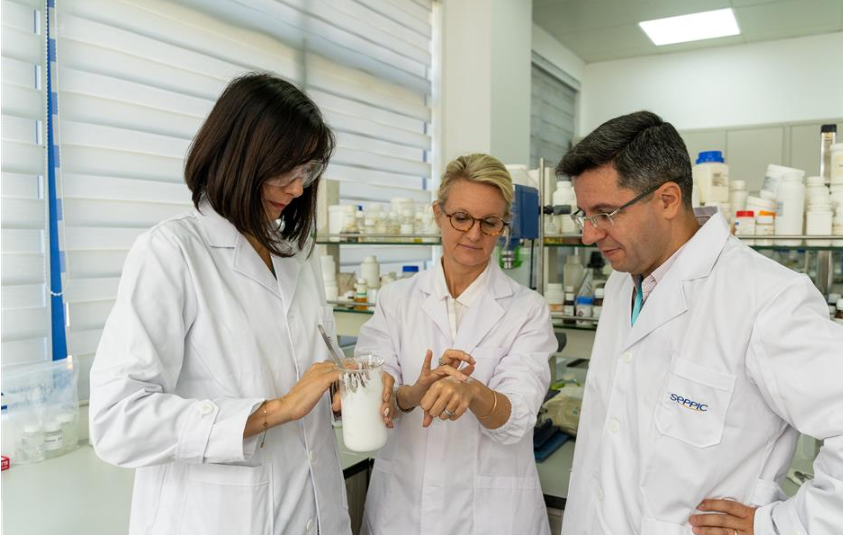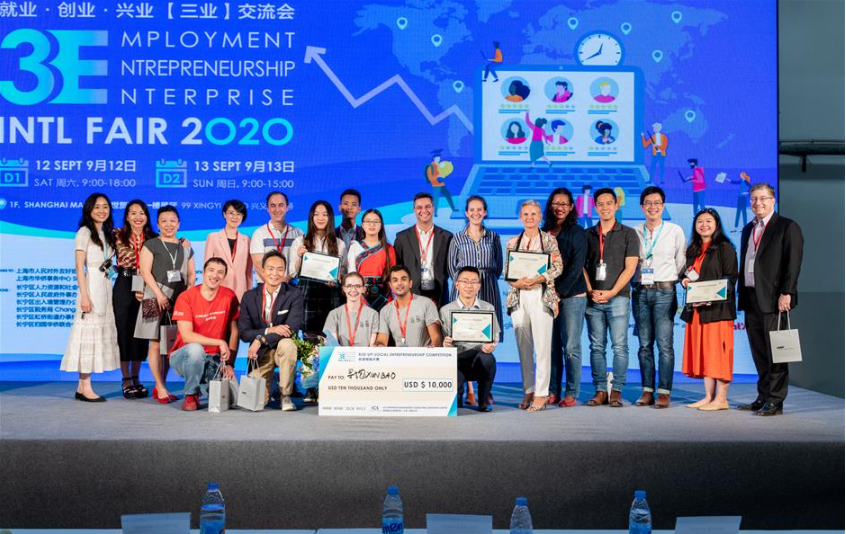
今日上海
外国人挖掘了他们在这座城市中隐藏的创业精神 - 2023年09月06日
Foreigners tap into their hidden entrepreneurial spirit in the city
Natacha Tarascon launched her company in her forties.
The 47-year-old Frenchwoman said she had spent nearly half her life overseas.
"My husband and I have been expatriates for almost 20 years."
After South America, Dubai and Hong Kong, the pair decided to move to Shanghai about 10 years ago, where she underwent a dramatic transition, leaving her established pharmacist job to venture into a new field while bringing up her three children.
"I only came with my idea."
But it was not an impulsive decision.
"There are a lot of good opportunities here," she added, labeling the local business environment with terms like "big market," "easy access," "efficient logistics," etc.
Her views are backed by Linda Painan, a Singaporean businesswoman and philanthropist based in the city.
"Shanghai is likely one of the best, if not the best, entry points for expats and their businesses into China."
In less than three years, Tarascon's child skincare brand, DOUCÉA, has established itself in the market, with goods on store shelves in both China and France. Hannah Quinlivan, wife of pop icon Jay Chou, serves as a brand ambassador.

Natacha Tarascon of France (center) with her lab assistants in Shanghai.
Shanghai attracts expat entrepreneurs, from Silas Aaron Hardoon and Ellice Victor Sassoon a century ago to Tarascon and Painan today, because of the city's inclusivity and inventiveness.
According to the Shanghai Administration of Foreign Experts Affairs, Shanghai has awarded over 400,000 work permits to expats since April 2017, with roughly 20 percent considered high-end talent. The city ranked first in terms of both the quantity and quality of foreign talent in the country.
Shanghai also topped a list of the most attractive cities on the Chinese mainland for expats for the eighth consecutive year in categories like expat-friendly policies, governmental administrative capacity, and working and living conditions, according to a pool released by the Ministry of Science and Technology in 2020.
Painan described Shanghai's attractiveness for expats by using three keywords: "global," "opportunity," and "diversity."
"Shanghai is one of the world's leading financial centers, with modern infrastructure and a cosmopolitan lifestyle that blends Eastern and Western cultures. Its cosmopolitan atmosphere makes it easier for expats to adjust," Painan said.
In terms of business, Kenneth Jarrett, senior advisor at Albright Stonebridge Group, believes Shanghai has one of the best business environments in the country.
"The government has an international outlook, recognizes and appreciates the role that the foreign business community plays in China, and has worked hard to streamline the bureaucratic steps involved in establishing and operating a business in Shanghai," said the former president of the American Chamber of Commerce in Shanghai.

Linda Painan (right) tries her hand at traditional Chinese opera.
Among a number of expat-friendly initiatives, streamlining procedures for them to apply for employment and residence permits has been enhanced, as has financial and administrative support.
When the Pudong International Talent Hub, a one-stop platform for scouting and serving overseas talent, opened in April 2019, Pudong led the city in awarding work and residency permits to expats in just five days.
In another case, two expatriates who moved to Shanghai to start a firm won the first work permits awarded to foreign entrepreneurs in Pudong in December 2020.
"For all of these reasons, Shanghai has one of the heaviest concentrations of foreign companies in China," Jarrett said.
Meanwhile, with the arrival of co-working spaces like WeWork, international incubators and accelerators like XNode, and more innovation communities, Shanghai has become a fertile ground for foreigners looking to launch their businesses.
In order to assist local expats, Painan founded the non-profit The Expatriate Center (TEC), which debuted the 3E International Fair in 2020 and seamlessly assimilated into the community's commercial fabric.
One highlight is the entrepreneurship competition.
So far, 236 competitors from 57 countries and regions have entered the competition, bringing over 75 projects in fields such as education, healthcare, artificial intelligence, agriculture, and community management. Out of them, 16 teams stood out, obtaining incubation as well as winning a total of 320,000 yuan (US$44,007) in incentives.
Tarascon was among them.

Natacha Tarascon (sixth right) and other winners at the 2020 3E International Fair.
She came up with the idea to create natural skincare products for children some years ago after discovering that her little daughter was suffering from eczema. She was growing weary of packing the child's cream in their luggage every time they took a flight back from France.
"It was stupid of me. As a pharmacist, I am skilled in formulation. That is when the idea of a brand for children first emerged."
However, it remained only an idea until the 3E International Fair.
She heard about the entrepreneurship competition from a friend and registered for it in 2020.
"In terms of my company, nothing was decided. So it was just the start of the narrative. I simply introduced the brand I wanted to create. I didn't have any products with me."
There, she received everything she needed, including professional guidance and financial support, to launch her firm.
"The business has been doing well," she remarked. "Normally, you open in France or elsewhere first. And after 10 years, you open in China. I did the reverse. I began in China, and in June this year, I opened in France."
Tarascon claimed it was not hard to open a business in Shanghai.
"It's very simple to set up an office, and it's very simple to open an account. They provide you with a lot of opportunities," she said, emphasizing that one of China's strong points is its sourcing.
"The packaging, sourcing, and manufacturing costs are much lower than in France. We can see that the quality is nearly identical, but the price in China is really reasonable."
The one challenge she faces, however, is registration and information.
"You need to have a good connection, good support from everyone, and what we call 'guanxi.' Because I've been here for over 10 years, it's easier for me to get the right person to help me find the right information."

Linda Painan (top) and her volunteers at The Expatriate Center.
According to a poll conducted by Painan's Center, "understanding government policies" remains one of the top worries because "not just being aware of what the policies are, but also what the implications are for various businesses."
"Information is scattered, a little here, a little there. But, as we say in English, to obtain concise information right from the horse's mouth per se, from an official site, I believe that's what they're searching for – to find a central placement for information, a one-stop shop," she added.
Jarrett, a 3E International Fair judge, emphasized the critical need for regulatory transparency and clarity.
"Sudden changes in regulations make it difficult for companies to plan," he explained. "Many foreign companies have made significant investments in China. As a result, they want their intellectual property to be recognized, they want the authorities to treat them fairly, and they want equal possibilities to flourish in China."
Language, too, can be a hindrance.
"The Chinese language is a particular challenge that many expats face. On a more practical level, it can be tough to handle the enormous array of phone apps that are so important to life in China," he remarked. "China's strong embrace of the digital world creates some degree of hardship for foreigners, even if it brings convenience."
Despite these issues, Shanghai remains a magnet for international talent and businesses.
"It's very dynamic; it's very cosmopolitan," Painan said of the city's mix of modern conveniences, business prospects, and cultural richness.
Shanghai, according to Jarret, has a well-trained and highly educated workforce, many top-tier colleges and research institutions, and many amenities that make it appealing to international residents – good housing, schools, medical care, and cultural events.
The ever-changing scenery in the city intrigues Bryce Jenner, the proprietor of five restaurants in Shanghai.
"Evolving and stimulating," he described the spirit of the city. "I've lived in the city for 23 years, and it still has that wow factor... You know, never get sick, never get old... The story is exciting. Shanghai is my home, and it is tough to leave home."
Source: Shanghai Daily

